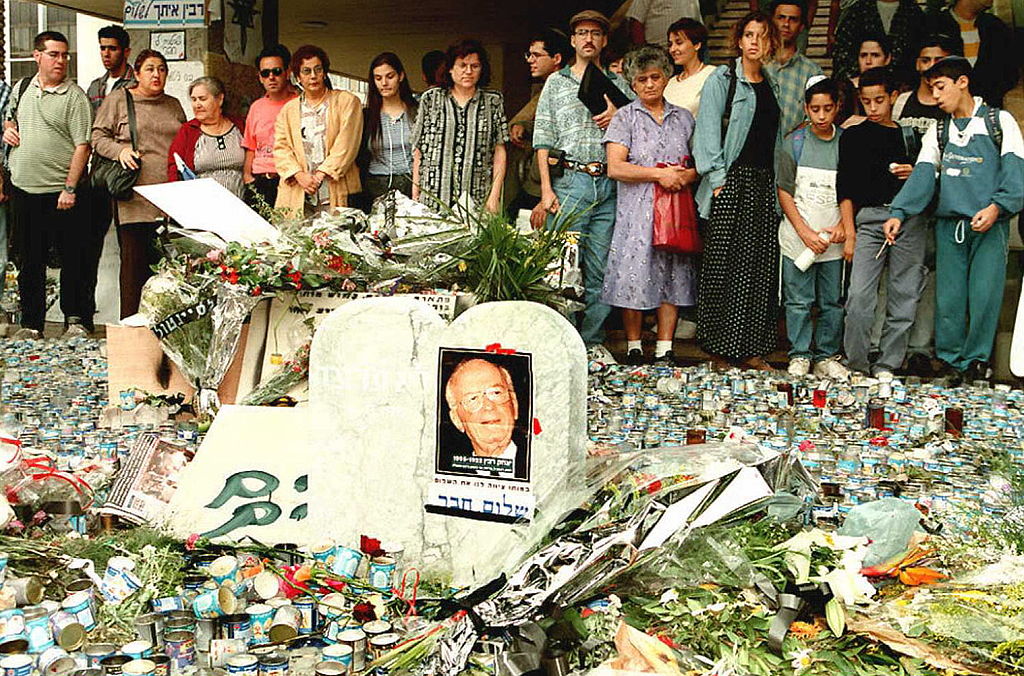Few political assassinations of a political leader have fundamentally and dramatically altered the course of a nation. American democracy, for instance, endured the assassination of Abraham Lincoln in 1865, and black Americans continued to enjoy their hard-won freedom. About a century later, the murder of President John F. Kennedy did not halt the legislative process that secured civil rights for African Americans. The most consequential political assassination in modern history was that of the Austro-Hungarian heir to the throne, Archduke Franz Ferdinand, in Sarajevo in June 1914. His death at the hands of Serbian nationalist revolutionaries served as the spark that ignited the first world war.
There is little doubt that since Rabin’s assassination, the right has worked relentlessly to erase his memory and obliterate any trace of the peace process and the hope it once represented
The assassination of Prime Minister Yitzhak Rabin, 30 years ago this week, was one of those rare, reality-altering events. In its aftermath, the Oslo Accords – the fragile process of peace and reconciliation with the Palestinians, which had already been progressing slowly and cautiously, amid mutual suspicion –suffered a devastating blow.
The assassin, Yigal Amir, a young Bar-Ilan university student and religious zealot, continued the tradition of anarchist or nationalist extremists who succeeded in their radical mission to halt a political process.
Many aspects of the events that led to the assassination and its aftermath resonate eerily with current realities in Israel in 2025: the deep polarisation of society, the rise of incitement, the weakness of the judicial system, the failures of the Shin Bet (Israel’s internal security service), and the proliferation of conspiracy theories.
After the signing of the Oslo Accords in September 1993, right-wing circles – especially among Jewish settlers – launched a public campaign that grew increasingly aggressive. What began as verbal incitement soon escalated into physical violence and criminal acts.
Meanwhile, Hamas intensified its terror campaign, sending suicide bombers into Israeli streets, restaurants, buses, and shopping centres – killing hundreds of Israelis and injuring thousands. Public trust and hope for a diplomatic settlement were deeply shaken. Yet Rabin remained steadfast in his determination to continue the Oslo process. ‘We will act for peace as if there is no terror, and fight terror as if there is no peace,’ he said repeatedly – a phrase that encapsulated his political and security doctrine.
As the Palestinian wave of terror grew, so too did the fury and incitement of the Israeli far right. Rabin was branded a ‘traitor’ and ‘murderer.’
Itamar Ben-Gvir – today Israel’s minister of national security – was then a young disciple of the extremist rabbi Meir Kahane, who preached Jewish supremacy. Ben-Gvir infamously tore the Cadillac emblem off Rabin’s car and declared before television cameras: ‘We got to the symbol – and we’ll get to him too.’ At several demonstrations, protesters came dangerously close to physically attacking Rabin.
Riding that wave of incitement were senior opposition figures from the Likud party, led by Benjamin Netanyahu. Netanyahu was among the most prominent voices fanning the flames. He marched at the head of a demonstration where protesters carried a coffin bearing Rabin’s name.
At a major rally in Jerusalem’s Zion Square, weeks before the assassination, Likud leaders stood on a balcony – among them Netanyahu, who delivered a fiery speech; Ariel Sharon, and others. When posters depicting Rabin in an SS uniform began circulating in the crowd, some Likud leaders, including future prime minister Ehud Olmert, realised the rally was spiraling out of control and left the scene. Netanyahu stayed.
After the assassination, Ami Ayalon was appointed head of the Shin Bet, replacing the failed Carmi Gillon. Ayalon told me last week bluntly that the politicians on the balcony may not have intended Rabin’s death, but their presence – without condemning the sights and chants of the rally – granted legitimacy to extremists. ‘It’s always the minority that acts,’ he observed.
The justice system also failed to act. Although 340 cases of incitement and violence were opened, prosecutors and judges dragged their feet – even after Rabin himself appealed to Supreme Court President Aharon Barak to intervene. ‘Our approach,’ admitted then–Attorney General Michael Ben-Yair, ‘was to show tolerance toward free speech and the right to protest. In retrospect, that was a mistake.’
Immediately after the assassination, right-wing activists – including Netanyahu – spread absurd conspiracy theories, claiming that the Shin Bet, Shimon Peres (who temporarily replaced Rabin as a prime minister) or even the CIA had orchestrated the killing, all in an effort to deflect blame from themselves.
A few months after the murder, Israel held elections, which resulted in the defeat of Peres and the victory of Netanyahu. Since 1996, with some breaks, Netanyahu has been serving as prime minister for 18 years.
In the years that followed, Israel was profoundly transformed. A straight line connects those days to what is unfolding in the country today – especially since the events of October 7, 2023, in Gaza. The same wild incitement by Netanyahu and the right against their political opponents has only intensified. Fake news and conspiracy theories have seeped from the fringes into the mainstream. Netanyahu’s evasion of responsibility for the surprise and brutal Hamas attack on October 7, and his refusal to establish a state inquiry commission, reflect the same patterns of behaviour that emerged three decades ago.
There is little doubt that since Rabin’s assassination, the right has worked relentlessly to erase his memory and obliterate any trace of the peace process and the hope it once represented. Instead of commemoration, the right has chosen to sanctify forgetfulness.
In a chilling way, the seeds of this calamity were planted back then, at the time of the assassination – and today, those seeds have grown into towering trees.
Yossi Melman is the creator of a new documentary about Rabin's assassination that will be broadcast on Israel’s HOT8 channel starting 3 November.







Comments